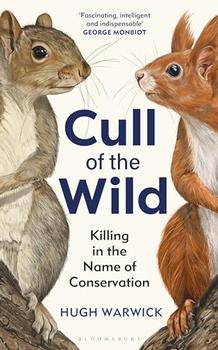
Killing in the Name of Conservation
by Hugh Warwick
Investigating the ethical and practical challenges of one of the greatest threats to biodiversity: invasive species.Investigating the ethical and practical challenges of one of the greatest threats to biodiversity: invasive species.
Across the world, invasive species pose a danger to ecosystems. The UN Convention on Biological Diversity ranks them as a major threat to biodiversity on par with habitat loss, climate change and pollution.
Tackling this isn't easy, and no one knows this better than Hugh Warwick, a conservationist who loathes the idea of killing, harming or even eating animals. Yet as an ecologist, he is acutely aware of the need, at times, to kill invasive species whose presence harms the wider environment.
Hugh explores the complex history of species control, revealing the global movement of species and the impacts of their presence. Combining scientific theory with gentle humour in his signature style, he explains the issues conservationists face to control non-native animals and protect native species – including grey and red squirrels on Anglesey, ravens and tortoises in the Mojave Desert, cane toads in Australia and the smooth-billed ani on the Galapagos – and describes cases like Pablo Escobar's cocaine hippos and the Burmese python pet trade.
Taking a balanced and open approach to this emotive subject, Hugh speaks to experts on all sides of the debate. How do we protect endangered native species? Which species do we prioritise? And how do we reckon with the ethics of killing anything in the name of conservation?
"Warwick's searching meditation on the ethical uncertainties surrounding culling ... brings clarity and insight to a fraught subject." ―Publishers Weekly (starred review)
"A thoughtful analysis of how to accommodate animal rights in an era of unprecedented environmental change." ―Kirkus Reviews
"Fascinating, intelligent and indispensable: Hugh Warwick tackles a crucial and difficult subject that has been avoided for far too long, and does so with style, insight and verve." ―George Monbiot
"Is killing for conservation right or wrong? There might be no easy answer, but Hugh Warwick employs honest and intelligent questioning in a fruitful, fascinating exploration of one of the skeletons in conservation's cupboard." ―Chris Packham
"It's hard to think of a more companionable guide to some of conservation's thorniest thickets than Hugh Warwick. Cull of the Wild is a journey navigated with courage, curiosity and compassion. Every nature lover should read it." ―Amy-Jane Beer
This information about Cull of the Wild was first featured
in "The BookBrowse Review" - BookBrowse's membership magazine, and in our weekly "Publishing This Week" newsletter. Publication information is for the USA, and (unless stated otherwise) represents the first print edition. The reviews are necessarily limited to those that were available to us ahead of publication. If you are the publisher or author and feel that they do not properly reflect the range of media opinion now available, send us a message with the mainstream reviews that you would like to see added.
Any "Author Information" displayed below reflects the author's biography at the time this particular book was published.
Hugh Warwick is an ecologist, writer and hedgehog expert. He is the author of three non-fiction narratives: A Prickly Affair, The Beauty in the Beast and Linescapes, and two books on hedgehogs and beavers. He has written for BBC Wildlife, New Scientist, The Guardian and The Daily Telegraph, and has spoken about wildlife protection on national television and radio. Hugh is the spokesperson for the Hedgehog Preservation Society and runs courses on hedgehog conservation.




If we did all the things we are capable of, we would literally astound ourselves
Click Here to find out who said this, as well as discovering other famous literary quotes!
Your guide toexceptional books
BookBrowse seeks out and recommends the best in contemporary fiction and nonfiction—books that not only engage and entertain but also deepen our understanding of ourselves and the world around us.